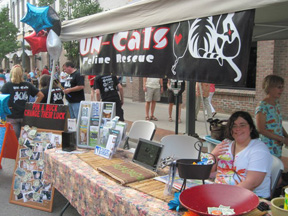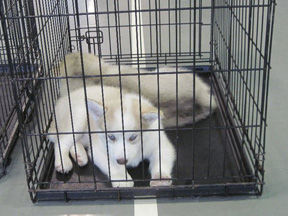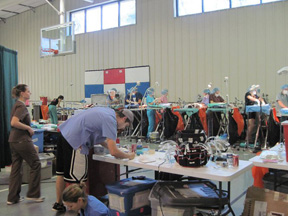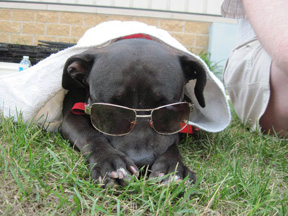What Kind of Humane Society Does Traverse City Want?
Editorial – by Publisher Jen Isbell
Over the past month, you have heard the appeal from the Cherryland Humane Society regarding their lack of funds to run their animal shelter. Because of the economy and stock-based donations, they have been running short of operational funds. They asked for $200,000 to continue operations through the end of the year. According to "The Ticker" Mike Cherry stated that they have raised about $120,000 so far. That money was raised by many generous individuals and businesses throughout our community who held fundraisers and got the word out that the shelter needed money.
Along with every other animal lover in our city, I am grateful to see so many caring people coming together to help the shelter stay open for another six months. However, money isn't the only thing that the Humane Society is lacking. They are also in great need of a change in policies and a dedicated community to hold them accountable.
There are many in town (and on the board of CHS) who don't appreciate my perseverance in helping to make Traverse City a no-kill community. I have made several unsuccessful attempts at getting on the board but even if I had made it through, I would have been only one person. The Humane Society's board of directors makes all of the policy decisions and they are the ones who do not want to be a no kill shelter. They are are also the ones against having a foster care system, spaying/neutering all animals before adoption, having a TNR (trap-neuter-release) program, having waiting periods for drop-offs, and many other strategies that successful no-kill shelters all over the country utilize.
The cold, hard facts from the Michigan Dept. of Agriculture shelter reports and their own financial reports speak for themselves. Based on their most recent financial reports available, only about 17.4% of the expenses at the Humane Society are used for direct animal care (utilities, medical supplies, food, shelter supplies, animal-misc., spay/neuter fund and CHS emergency fund). The rest of the money is used for overhead, their two biggest expenses being salaries and the interest expense (building loan).
I have also seen it reported in the news lately about the bad economy and how Cherryland is facing tough times because of it. That may be true as it relates to donations and expenses, but the Humane Society actually took in less cats and dogs in 2010 than it did 2009, 2008 and 2007. The sad thing is that even though they were responsible for 773 less cats in 2010 than the previous year, they actually killed 10.6% more cats on a percentage basis. When you look at their Michigan Dept. of Agriculture shelter statistics, you will be very impressed with their dog adoptions and they are to be commended for that. However, their cat adoption & euthanasia statistics continue to be dismal. Why is there a higher value put on their dogs than than there is on the cats at the shelter? Without foster homes to bottle feed the kittens, their euthanasia rates for cats six months old and younger will not improve.
What are the possible reasons for a lack of financial support for our Humane Society leading up to this point? As you read through their yearly financial reports over the past few years, you will see that they have relied heavily on donations from wills, memorials and high end fundraisers. They don't do the bake sales and the usual community fundraisers such as Friday Night Live, Bark at the Park or have booths at local festivals and events with off-site animal adoptions. Many people don't donate to them because of their lack of a spay/neuter policy and their high cat euthanasia rates. Still, other people donate to more community-based animal rescue organizations in our area with a proven track record of saving lives. And the people who might want to donate to Cherryland can't find a way to do it online. If they are so desperately lacking in funds, surely they can figure out a way to accept credit card donations on their website.
In addition, their website needs to contain more information about the animals and what they are like, not the sterile information found there now. And why isn't the shelter on Facebook? Why don't their newsletters include animal adoption stories instead of names of donors? Cherryland needs to quit doing business the old way and head in a new direction that will save more lives.
A few years ago when I ran for the board for the first time, Deborah Schutt from the Michigan Pet Fund Alliance, drove up to Traverse City to be in the board meeting when I submitted my no-kill proposal. Her group offered to help Cherryland transition into a no-kill facility, at no cost, and the offer was dismissed by the board. According to Deborah Schutt, she has never been contacted by CHS about the proposal.
Any animal shelter can successfully embrace the no-kill philosophy. There just needs to be the will to do it. It requires commitment, dedication, transparency, collaboration and community support.
One such example is the organization U-Paws (Upper Peninsula Animal Welfare Shelter) in Negaunee. They did a complete turnaround on their adoption/kill rates - from 60.3% (1999-2006) to 6.2% in 2010. They made some hard decisions and took positive steps towards becoming the shelter they are today. Like many shelters, they had an administrator who had been there over 20 years and was resistant to change and the shelter had outdated policies. Luckily, they had a fairly new board of directors who were open and ready for change. They decided to "think outside the box" and believed there is always another option besides killing if they looked for it. And yes, they are still an open admission shelter - just like Cherryland is. Click here for a letter written to the Michigan Pet Fund Alliance from U-Paws about how they were able to turn their shelter around.
After all is said and done, a no-kill shelter ends up with more community support because people aren't afraid to walk into the building anymore. A no-kill shelter also ends up with more volunteers and donations because people believe in what they are doing.
So what will change at the Humane Society by the end of the year so that they don't find themselves back in the same situation? The only way for there to be real change is for the board to know how you feel about YOUR local shelter. Go to the yearly membership meeting, email them, write them a letter or run for a board position. If they don't hear from you, they won't know what kind of shelter you want to have.
There is no reason why Traverse City can't be a no-kill community. The generous donations to the Cherryland Humane Society this month has proven that there are people in our area who care about the animals. Now they just have to speak out for those animals as well.
And please take a moment to look at the PAW awards and the shelter stats of the other animal organizations in our area. Think about how your dollar is best spent. Is it going to a group that uses most of their money for direct animal care and doesn't euthanize many of their pets? A lot of these smaller groups are scrambling all year long to keep afloat and really need your help.
Bark at the Park Photos from August 2011
Everyone had a great time at this year's Bark at the Park in Traverse City. Hope you got a chance to stop by. If not, please click here for some photos from the event.
Animal Shelter in New Hands in Escanaba
On Monday August 15th, the Delta Area Animal Society took over operations of the Delta County Animal Shelter to prevent it from closing. The county can no longer afford to keep it open. The Delta Area Animal Society looks forward to providing a safe shelter for the
unwanted, lost, stray animals of Delta county and will strive to adopt the animals into loving homes. They look forward to working with this community. Click here for their website.
Local Rescue Groups Have Fun While Getting Donations for their Organizations at Friday Night Live in Traverse City
Below are photos from the HOPE booth (Helping Owners with Pet Expenses).

Below are photos from the Un-Cats booth.


Surrendering an Animal
From Susan Reabe, HOPE Director
Pets are given up for a variety of reasons... Financial concerns, behavior problems, a move to a no pet housing, aggressive behaviors and allergies just to name a few.
Fortunately, there are more alternatives than ever to relinquishing your pet.
If you are thinking about surrendering your dog, cat or other companion animals please first consider utilizing the following resources:
• Frustrated with a pet behavior issue? Free assistance is available by phone through Michigan Humane Society help line. The MSBH line is a free service that can provide you with answers to your questions about resolving basic behavior issues and recommendations on where to go for help with more complex issues that can’t be handled on the phone. The staff and trained volunteers will do their best to provide helpful information.
• If your pet is acting out of character your first step should be to see your veterinarian.
• For example: a cat that is suddenly stops using it’s litter box they might be suffering from an infection or a dog that normally loves people might shy away from people if in pain.
• Call 248-650-0127 and leave a detailed message. You can expect to receive a return phone call in 48 hours of the receipt of your message.
• Finding “Pet friendly” apartments can take a little more time, but there are many options for people with pets. Try visiting one of the many websites tailored to the needs of pet guardians such as Peoplewithpets.com which allows you to save time by allowing you to search for pet friendly apartments in various communities, in your target price range with the amenities you specify.
• Cat allergies are a common problem. The good news today is that your veterinarian can recommend many helpful products and tips to “Lose” the allergies rather that lose your cat.
• Spaying and neutering your pet can cut down on aggression, marking, roaming etc.
• Pet overpopulation: an estimated 3-4 million dogs & cats are euphemized in our country because there are more unwanted pets than available homes. So before you make the decision to surrender your pet please utilize all the options available.
• Another option if financial concerns are an issue is a non-profit organization called H.O.P.E. ( Helping Owners with Pet Expenses) they provide temporary help with food and vet care preventing you from having to surrender your pet.
• If you have exhausted all options and would like a list of organizations that will care for and adopt out the pet H.O.P.E. can also give you a list of organizations that will assure you your pet will be cared for and adopted out be a kind, loving family, and not end up in a shelter that euthanizes the animals.
Contact Info for H.O.P.E.
Susan Reabe
Director
231-631-7222
Email Susan
Website
New Non-Profit Hopes to Assist Struggling Pet Owners with Vet Bills and Pet Food
With high unemployment numbers and many people struggling to make ends meet, many pet owners are finding that they have to give up their pets because they can no longer afford the care that they need. Imagine losing your job one week and finding out your precious pet needed $500 surgery the next week. It's a heartbreaking story.
That's where Susan Reabe steps into the picture. A retired RN and the wife of local veterinarian, Dr. Kevin Reabe (East Bay Animal Hospital in Acme), Susan decided to start the Traverse City non-profit "H.O.P.E" - Helping Owners with Pet Expenses. After realizing that the number of animals being dropped off at shelters was increasing due to current economic problems, she decided to do something on the front end of the problem to help families keep their pets in their own homes. This takes the burden off the shelters and rescue groups and in many cases, it saves the animal from possible euthanasia.

H.O.P.E. seeks to provide temporary food, care and assistance with medical bills to owners who are going through financially tough times. They want to keep pets with the families until they get back on their feet.
Right now, they are having a pet food drive. You can drop off new canned and bagged pet food at the Bay Area Pet Hospital in Traverse City or the East Bay Animal Hospital in Acme.
Please click here to read more about H.O.P.E. at their website.
And join the Facebook page here.
I have also found a pretty good resource at this HSUS website. They have a comprehensive list of pet financial aid-related organizations.
Northern Lower Michigan Gets Spay/Neuter Assistance from MSU
On June 25th & 26th, Michigan State vet graduates and advisors showed up at the Our Lady of the Lake Catholic Church in Houghton Lake to do 194 low/cost spay and neuters for the lower Northern Michigan community. This is something the group does about seven to eight weekends a year, setting up "shop" in different locations all over Michigan. The patients included animals from local rescue groups such as Un-Cats, Handds, Frisco & Joey's Mission and the Wexford Animal Shelter.


For only $20, animals got spayed or neutered and also received rabies vaccines, flea medication and distemper shots.

DeeDee at the Roscommon Co. Animal Shelter contacted the MSU program about setting up the program in our area and got the word out to the community. Thanks to Un-Cats for the great photos!
More Pending Legislation in Michigan
From HSUS - MI (Jill Fritz)
As many of you know, Rep. Tim Bledsoe recently introduced HB 4714, a bill to prohibit the ownership of pit bulls in Michigan. I immediately met with Rep. Bledsoe to explain HSUS’s opposition to breed-specific legislation (BSL) and offered alternatives such as strengthening the state’s dangerous dog law—to address the real problem of irresponsible dog ownership—and even potential legislation to regulate the long-term tethering of dogs, which studies show leads to dog aggression and neglect by owners.
Countless bully breed advocacy and animal welfare organizations have contacted Rep. Bledsoe and House committee members to express their opposition to the bill. A hearing is not yet scheduled on the legislation, but we will continue to monitor it and make sure that Michigan legislators know that banning breeds is not the answer. For more information on how you can help with legislation to regulate dog tethering, visit the Facebook page for Michiganders for Civilized Dog Tethering.
Senator Bieda’s bill to stop the poisoning of children and animals from ingesting antifreeze, SB 421, is still awaiting a hearing in the Senate Committee on Economic Development. Thank you to Senators Bert Johnson, Glenn Anderson, and Rebekah Warren for co-sponsoring this bill, which would require engine coolant/antifreeze to include a bittering agent to render it unpalatable. Similar legislation has already been passed in 15 other states.
Senators Rick Jones, Steve Bieda, and Bert Johnson have introduced SB 356, SB 357, and SB 358 to increase penalties for animal fighting in Michigan. The package of bills would allow the forfeiture and seizure of property used for animal fighting, declares property on which animal fighting is conducted to be a nuisance, and would include animal fighting as a predicate offense for a charge of racketeering. The bills passed unanimously out of the Senate Judiciary Committee in May, and now await a vote on the Senate floor.
Michigan Pet Lemon Law Passes Regulatory Reform Committee
The Regulatory Reform Committee voted yes to the proposed “Pet Lemon Law” S.B. 574 (Sub 2) yesterday after purchasers offered heartbreaking testimony. This bill would offer consumer protections for purchasers of dogs and cats. Under S.B. 574, people who purchase sick or diseased animals from pet shops, breeders or dealers would have specific recourse against the sellers.
Puppy Mill Awareness of Southeast Michigan applauds Sen. Steve Bieda (D-Warren) for leading S.B. 574, which would offer options for the purchaser, including returning the animal for a full refund and replacement or recovery of veterinary expenses. The bill includes specific time frames for reporting illnesses, maximum amounts a buyer can recover, and provisions for congenital defects in the purchased animals.
The full text of S.B. 574 can be found here.
"This will hold pet sellers accountable for burdening the public with veterinary costs and emotional stress of caring for a sick pet," said Pam Sordyl, founder of Puppy Mill Awareness. "We commend Senator Bieda for addressing this costly problem, and for protecting the additional victims of the pet trade: consumers."
Liz Frates, of Ann Arbor, told Puppy Mill Awareness that she purchased a 16-week-old Yorkshire Terrier from a Michigan breeder for $1,200 in cash last year. She was told that the puppy was healthy. The breeder’s full written pet guarantee against anything congenital or hereditary did not help Liz in court, after the puppy was diagnosed with grade 2 luxating patellas in both legs – a congenital defect requiring surgery totaling nearly $3,200. Liz had already spent $900 in veterinary costs addressing breathing and diarrhea problems that the puppy had endured since his purchase.
“Without laws in place irresponsible breeders have free reign to find loop holes and continue with their unethical practices.” said Frates. “Pet insurance will not cover hereditary, genetic or congenital defects and most people cannot afford the thousands of dollars in vet bills and surgeries to correct such health problems.”
What Can You Do When You See a Dog in a Hot Car?
Every year, dogs die after being locked inside hot cars. Leaving a dog for even a couple of minutes can be a fatal mistake. Your assistance is invaluable in an effort to spread the word about how dangerous hot cars are for dogs. Download or order United Animal Nations' "Don't Leave Me in Here — It's Hot!" fliers. Keep a stack handy for whenever you're out and about. When temperatures rise and you see a dog in a parked car, slip the flier under the car's windshield wiper. When the dog's guardian returns to the car, he or she will find the educational flier and will think twice about leaving his or her companion in a hot car again. This flier saves lives! You can also download the order form to use for tabling events and to spread the word to others on how to order and distribute these lifesaving fliers.
Defending the Defenseless: A Guide to Protecting and Advocating for Pets
This book outlines how you can do more to help companion animals. This is a heart-warming book of people and organizations who are taking extraordinary steps to help animals. If you love animals, this book show you how to get involved, from the simplest of tasks to more extensive involvement. If we all just take one small step to help pets, we will launch the tipping point to end cruelty and homelessness. You can purchase this book at Amazon or go to www.alliephillips.com and request an autographed copy. This book is due out in late September.
The book features several Michigan advocates and organizations including Holly Thoms with Voiceless-MI, Carol Manos with Carol's Ferals, Jennifer Pierce an attorney in Farmington Hills, Laurel Barrick with Rolling Rescue, and the Roscommon County Animal Shelter.
Click here for a list of Allie's appearances and book signings.
National Center for
Prosecution of Animal Abuse Launched
The National Center for Prosecution of Animal Abuse (NCPAA) is a program of the National District Attorneys Association (NDAA), created in partnership with the American Society for the Prevention of Cruelty to Animals (ASPCA) and Animal Legal Defense Fund (ALDF) to educate and train prosecutors and allied professionals on the effective handling of animal cruelty and neglect cases, including cases involving the co-occurrence of animal abuse and violence to people. NDAA desires to bring greater awareness to the often misunderstood nature of animal maltreatment and how it can interconnect with family violence and contribute to lethality issues for victims of interpersonal violence. With growing awareness by the public to recognize and report animal abuse, combined with increased attention by the media, prosecuting attorneys need the resources to properly address incidents of animal abuse in their community and properly hold offenders accountable.
This group was launched by Allie Phillips, author, attorney and advocate with funds from the Animal Welfare Trust.
Be sure to sign up for the newsletter here.
Rally Draws Dog Supporters and Lovers
Clutching signs that read "Free Them All," "We Will Fight For Their Life" and "Stop Wasting Taxpayers Money," a group of animal lovers spent the majority of Thursday at the Custer statue in Monroe drumming up support for three condemned pit bulls. Click here for more on the story.
The Delta County Animal Shelter in Escanaba was Turned over to New Management
The Delta County Animal Shelter in Escanaba was turned over to new management on August 15.
The following was recently posted on their Facebook page:
From January 1, 2010 through August 13, 2010, a total of 581 animals came though the shelter. Of that number, 160 were euthanized for... a total of 28%. From January 1, 2011 through August 13, 2011 (the last public day of operating as a county-run shelter), 645 pets had already come through the doors and 86 were euthanized, for a total of 13%!
This is a greater than 50% drop even though 64 more animals came in. This number includes animals brought in at end of life, injured and sick animals, etc. We are proud of the vast improvement in this important area. It shows that our hard work paid off with more animals returned to their owners, more being adopted, more being treated medically to become adoptable, more sent to rescues, etc.
There will always be pets that need to be put out of their pain, but with hard work by the new administration, we expect this number to be even lower in the future. However, the solution to keeping this number low is to increase the number of spayed/neutered pets.
If you are having financial difficulty in affording the cost to alter your pet, please ask about the Cinderella Fund the next time you visit the shelter or your local vet. You can also download an application at www.deltaanimal.org. We, again, wish the new administration the best of luck and success in providing an even better and safer haven for the lost and unwanted pets of Delta County.
Your Town Hero: Brian Manley and June McGrath
It takes a unique person to completely dedicate their life to something to get nothing but a "good job" or "way to go" in return. But we found a Northern Michigan couple who has dropped everything to give animals a second chance in life. We meet the couple in this month's "Your Town Hero" report. Meows and hisses, barks and growls. Brian Manley and June McGrath have heard every imaginable sound a dog or cat makes. Click here for more info.
Parvo Outbreak in Grand Traverse County
Local veterinarians say they haven't seen a Parvovirus outbreak like this in years. Just in the past two weeks, at least seven dogs died from the disease. Click here for more on the story.